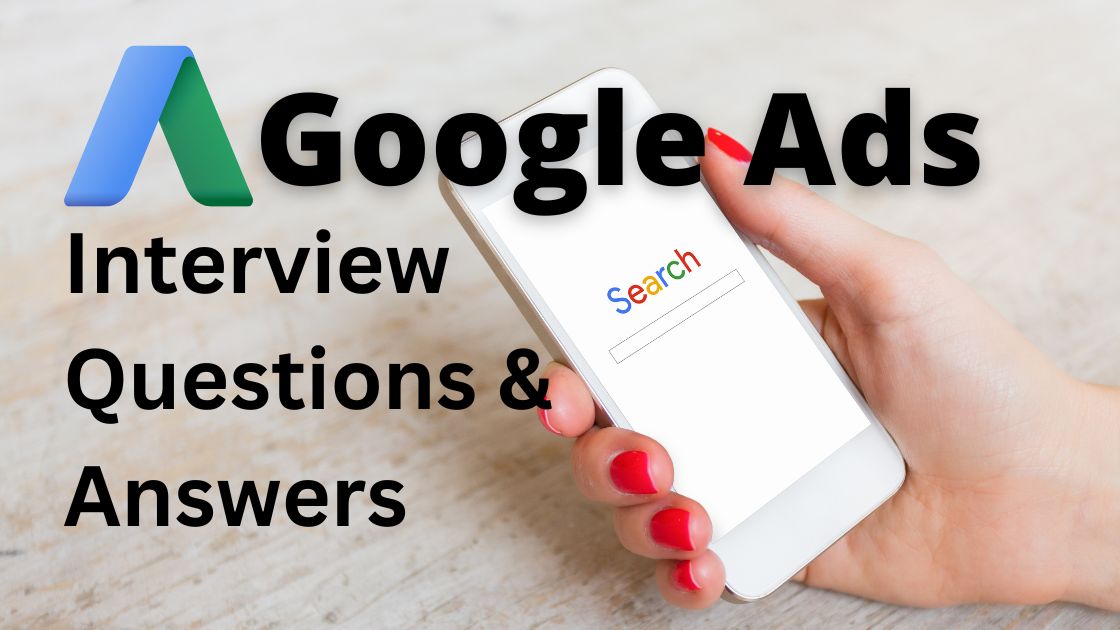📧 mithvin@gmail.com
📞+91 900 608 4701


Google Ads, formerly known as Google AdWords, is a powerful advertising platform that allows businesses to reach their target audience through paid search ads. Effective keyword management is crucial to the success of any Google Ads campaign. Here are the Top 25 Beginners and Expert Level Google Ads Interview Questions based on Keywords. By addressing these PPC interview questions, you gain a comprehensive understanding of keyword strategies, helping you optimize your campaigns effectively.
By understanding these expert level Google Adwords interview questions and answers, you can master keyword strategies, advertisers can significantly improve their ad performance, lower PPC costs, and increase ROI (Return on Investment). Also, it will help you crack the Google Ads or PPC ads interview questions if you are going to appear.

So, let’s go through the top google ads interview questions and answers to master yourself. You can also contribute by answering these interview key words questions in the comment box to help future visitors gain insights from your expertise.
Keywords are terms or phrases that advertisers bid on to trigger their ads in search engines. For example, “running shoes” could be a keyword for a sports retailer. Effective use of keywords can significantly impact ad visibility and performance.
Search queries are the actual terms users enter into search engines. For example, “best running shoes for women” is a search query. Understanding search queries helps advertisers match their ads to what potential customers are looking for.
The main types of keywords in Google Ads are:
Broad Match is a keyword type that triggers ads for searches related to the keyword, including synonyms and variations. For example, “women’s hats” might show ads for “buy ladies’ hats” or “hats for women.” This match type helps increase reach.
Phrase Match keyword triggers ads for searches that include the exact phrase or close variations, with additional words before or after. For example, “running shoes” might trigger ads for “best running shoes for men” or “cheap running shoes.”
Exact Match keyword triggers ads only for searches that exactly match the keyword or close variants, like misspellings or plural forms. For example, “red shoes” might show ads for “red shoes” or “red shoe.”
Broad Match Modifier (BMM) allowed more control than broad match by requiring specific words to be present in the search query. BMM has been incorporated into the broad match type as of 2021.
Broad Match increases ad reach, helps discover new keyword opportunities, and drives more traffic. It captures a variety of search queries, enhancing visibility.
Negative Keywords prevent ads from showing for specific irrelevant search queries. For example, adding “free” as a negative keyword prevents ads from showing for searches like “free running shoes,” ensuring ad relevance.
Negative Keywords improve ad relevance, increase CTR, reduce costs, and prevent ads from showing on irrelevant searches, enhancing overall campaign performance.
Broad Match is the default keyword match type used by Google Ads if no specific match type is specified.
Using Broad Matches with Negative Keywords allows for a wider reach while filtering out irrelevant traffic, providing flexibility and capturing a broader audience compared to Exact Match alone.
Keyword Insertion dynamically updates ad text to include the keywords that triggered the ad, making ads more relevant to users’ search queries. For example, if “running shoes” triggered the ad, the ad might display “Buy Running Shoes.”
Keyword Density is the percentage of times a keyword appears on a webpage relative to the total word count. It helps in SEO (Search Engine Optimization) to optimize content for search engines. For example, if “running shoes” appears 5 times in a 100-word article, the density is 5%.
The Search Terms Report shows the actual search queries that triggered your ads and received clicks. It helps identify new keywords, add negative keywords, and refine targeting for better campaign performance.
The Search Terms Report allows you to view performance data for search queries that triggered your ad and received clicks.
Google Ads Keyword Planner is a tool that helps advertisers find new keywords, get search volume data, and estimate costs. It aids in building effective keyword lists for campaigns.
Popular third-party PPC tools for keyword research include SEMrush, Ahrefs, Moz Keyword Explorer, and Ubersuggest.
When building a new keyword list, consider relevance, search volume, competition, user intent, and cost-per-click (CPC).
Key parameters include CTR, conversion rate, cost-per-conversion, and ROAS (Return on Ad Spend) to determine keyword effectiveness.
Use the “Find duplicate keywords” tool in Google Ads campaigns to identify and manage duplicate keywords within your campaigns.
Focus on relevance, search volume, user intent, competition, and potential ROI when assigning keyword research.
Yes, you can use all keyword match types (broad, phrase, exact, and negative) within a single ad group to cover various search intents and optimize performance.
Possible reasons behind not showing your ads for the targeted terms, which are “Content Writing Services” or “Google Ads Expert“, may include several factors. A few of them are;
The actual ad amount for the targeted term “SEM Free Audit” will be based on the next highest bid plus a small amount, up to your max CPC of Rs.100. For example, if the next highest bid is Rs.90, you might be charged Rs.91.
Google Ads offers various tools and reports, such as the Search Terms Report and Keyword Planner, that provide valuable data to refine keyword selection and improve ad performance. Leveraging these insights can lead to more targeted and successful advertising efforts.